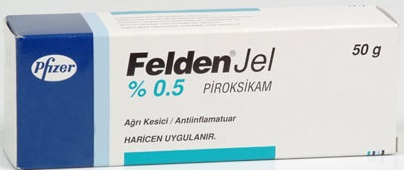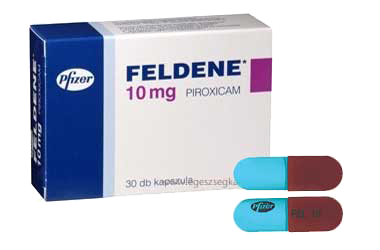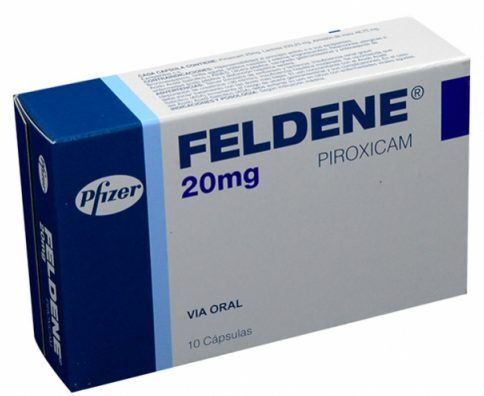Feldene (Piroxicam)

Dosages
Feldene 20 mg
| Quantity | Price per pill | Total price | |
|---|---|---|---|
| 60 | $0.83 | $50.00 | |
| 90 | $0.70 | $63.00 | |
| 120 | $0.64 | $77.00 | |
| 180 | $0.57 | $103.00 | |
| 270 | $0.53 | $143.00 | |
| 360 | $0.51 | $182.00 |
Payment & Shipping
Your order is securely packed and usually ships within 24 hours. Below is what a standard package looks like.
It is about the size of a regular letter (9.4x4.3x0.3 inches) and shows no details about what is inside.



| Shipping Method | Estimated delivery |
|---|---|
| Express Free for orders over $300.00 | Estimated delivery to the U.S.: 4-7 days |
| Standard Free for orders over $200.00 | Estimated delivery to the U.S.: 14-21 days |









Discount Coupons
- Independence Day - July 4, 2026 10% JULY410
- Labor Day - September 7, 2026 7% LABOR07
- Thanksgiving - November 26, 2026 9% THANKS09
Brand Names
| Country | Brand Names |
|---|---|
 Argentina Argentina | Axis Benisan Brionot Calmapir Fabopxicam Flogosine Homocalmefyba Ketazon Maxtol Micar Nac Nalgesic Osteocalmine Piroalgin Pirofix Roxicam Samaruc Sindrolen Solocalm Tirovel Tricifa Trixicam Truxa Truxa R Vefren Velaned |
 Australia Australia | Candyl Fensaid Mobilis Pirohexal-D Pirox Rosig |
 Belgium Belgium | Brexine Docpiroxi Piromed Piroxitop Piroxymed Polydene Solicam |
 Brazil Brazil | Anartrit Anflene Brexin Cicladol Farmoxicam Feldanax Feldexican Feldox Feldran Felnan Flamadene Flamarene Flamostat Flogene Flogoxen Floxicam Inflamene Inflanan Inflanox Inflax Lisedema Pirogreen Piroxam Piroxene Piroxifar Piroxifen Piroxiflam Piroxil Piroxin Piroxinid Piroxiplus Prodoxidil |
 Canada Canada | Brexidol Fexicam Novo-Pirocam Nu-Pirox |
 Czechia Czechia | Arthremin Flamexin Hotemin Piroflam Pirox Pro-Roxikam Reumador |
 Denmark Denmark | Brexidol Felden Pirkam Pirom Pironet Piroxigea |
 Finland Finland | Brexidol Felden Piroxal Piroxin |
 France France | Brexin Cycladol Flexirox Geldene Inflaced Olcam Proxalyoc Zofora |
 Germany Germany | Brexidol clinit durapirox Fasax Felden Flexase Jenapirox Mobilat Akut "Piroxicam" Piro Piro-Phlogont Piro-Puren Pirobeta Piroflam Piroflex Piro KD Pirorheum PirorheumA Pirox Pirox-Spondyril Piroximerck Pra-Brexidol ratioMobil Rheumitin |
 Greece Greece | Bleduran Brexin Calmopyrol Conzila Fidinor Flodeneu Grecotens Inflamase-N Neo Axedil Nilvo Oximezin Painrelipt-D Pedifan Proponol Pyrcost Reumaplus Rheumaplus Ruvamed Sinartrol Valopon Zerospasm Zitumex |
 Hungary Hungary | Brexin Erazon Flamexin Hotemin Huma-Pirocam Pirorheum |
 Italy Italy | Algoxam Antiflog Artroxicam Brexin Brexivel Bruxicam Cicladol Cicladol L Ciclafast Clevian Dexicam Errekam Euroxi Flodol Flogobene Ipsoflog Lampoflex Nirox Oxicam Pirobec Piroftal Pivaloxicam Polipirox Reucam Reudene Reumagil Riacen Roxene Roxenil Roxiden Roxim Sinartrol Spirox Unicam Zacam Zelis Zen Zunden |
 Japan Japan | Baxo |
 Malaysia Malaysia | Brexin Felxicam Focam Rhumagel Roxitan Uphaxicam |
 Mexico Mexico | Ainek Androxicam Apopiran Arlexicam Artinor Artyflam Asabon Axtrim Bapixied Bioximil Brexicam Brexodin Brucam Campirex Citoken T Dixonal Dolzycam Edecam Facicam Farmicam Flogosan Glandicin Osteral Oxi-Reul Oxicanol Perfarin Pirodax Piromav Pirox Piroxan Piroxen R-Tyflam Reucam Reufel Reutricam Ripox Rogal Serpicam Tripirol Vatrem |
 Netherlands Netherlands | Brexine |
 New Zealand New Zealand | Candyl Piram-D Pirohexal-D |
 Norway Norway | Brexidol Felden Pirox Tetram |
 Poland Poland | Flamexin Hotemin |
 Portugal Portugal | Brexin Flexar Flogocan Remisil Reumoxican Roxazin |
 Spain Spain | Artragil Brexinil Cycladol Dekamega Doblexan Feldegel Improntal Salcacam Salvacam Sasulen Vitaxicam |
 Sweden Sweden | Brexidol Felden |
 Turkey Turkey | Cycladol Felden Inflamex Oksikam |
| Manufacturer | Brand Names |
|---|---|
| Mankind Pharma | Doloforce DT |
FAQ
Description
Uses and Indications of Feldene
The nonsteroidal anti-inflammatory medication Feldene is prescribed to relieve the symptoms of osteoarthritis (OA) and reduce the symptoms of rheumatoid arthritis (RA).

Administration & Dosage
Depending on each patient's unique treatment objectives, use the lowest effective dosage for the shortest time. The recommended dose is usually 20 mg once daily for both OA and RA.
Dosage forms and strengths: 10 mg and 20 mg of Feldene (piroxicam) capsules.
Restrictions
- Hypersensitivity to piroxicam or any other ingredient in the medication.
- A history of allergic responses, such as urticaria or asthma, following aspirin or other NSAID use.
- When undergoing CABG surgery.

Cautions and Warnings
- Hepatotoxicity: Your doctor will tell you about hepatotoxicity symptoms and warning indicators. If abnormal liver tests continue, get worse, or if liver disease symptoms and signs appear clinically, stop taking the medication.
- Hypertension: Patients receiving certain antihypertensive medicines may experience a reduced response to NSAIDs when using them. Observe your blood pressure.
- Heart Failure and Edema: Patients with severe heart failure should not use Feldene unless the advantages are anticipated to outweigh the danger of their condition getting worse.
- Renal Toxicity: Monitor renal function in those suffering from hypovolemia, heart failure, dehydration, or hepatic or renal impairment. Patients with advanced renal illness should not use Feldene unless the benefits are anticipated to outweigh the risk of decreasing renal function.
- Anaphylactic Reactions: In case of an anaphylactic reaction, seek emergency help.
- Asthma Exacerbation Associated with Aspirin Sensitivity: Patients with asthma sensitive to aspirin should not take Feldene.
- Severe Skin Responses: Stop using Feldene as soon as a skin rash or other hypersensitivity symptoms emerge.
- Drug Reaction with Systemic Symptoms and Eosinophilia (DRESS): Stop and do a clinical evaluation.
- Hazard to the Fetus: Owing to the possibility of oligohydramnios or fetal renal impairment, during the first 20 to 30 weeks of pregnancy, avoid using NSAIDs, especially Feldene. Because of the dangers of oligohydramnios/fetal renal impairment and premature closure of the fetal ductus arteriosus, women should refrain from using NSAIDs starting at about 30 weeks gestation and continuing throughout their pregnancy.
- Hematologic Toxicity: Whenever a patient exhibits any indications or symptoms of anemia, check their hemoglobin or hematocrit.
- NSAIDs have been linked to infertility. Take into account stopping Feldene in women who experience infertility.

Adverse Reactions
The most frequent adverse events (occurring more than 2% of the time in clinical studies) were headaches, nausea, constipation, flatulence, diarrhea, abdominal discomfort, dizziness, rash, and edema.
Drug Interactions
- Medications that disrupt hemostasis, such as aspirin, warfarin, and selective serotonin reuptake inhibitors (SSRIs)/serotonin-norepinephrine reuptake inhibitors (SNRIs), etc.: When patients use Feldene together with medications that affect hemostasis, watch for bleeding. Taking Feldene with analgesic doses of aspirin is generally not advised concurrently.
- Beta-blockers, angiotensin receptor blockers (ARB), and ACE enzyme inhibitors: When used with Feldene, these medications' antihypertensive effects may be lessened. Observe your blood pressure.
- Diuretics: The natriuretic effects of furosemide and thiazide diuretics can be lessened by NSAIDs. Observe patients to ensure that diuretics are effective, considering any antihypertensive effects.
- Digoxin: Using Feldene concurrently with digoxin can raise serum levels and extend its half-life. Track your blood levels of digoxin.









